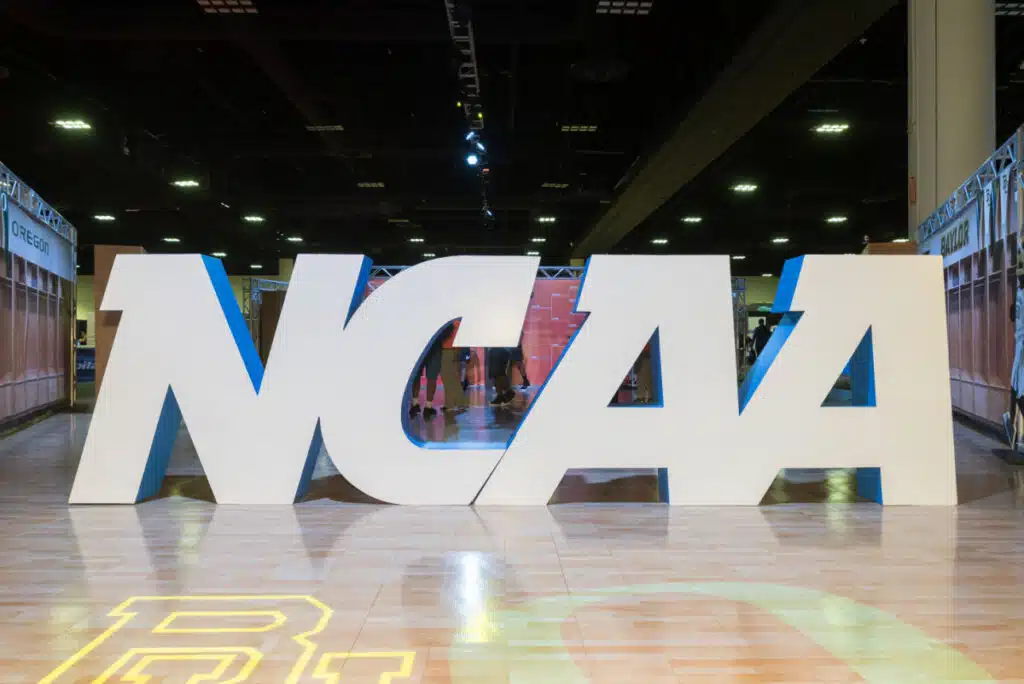
NCAA bylaws class action lawsuit overview:
- Who: Joseph Colon, Shannon Ray, and Kyle McKinley filed a class action lawsuit against the National Collegiate Athletic Association (NCAA).
- Why: Colon, Ray, and McKinley claim the NCAA violated the Sherman Act by allegedly conspiring with its member schools to fix the compensation of certain Division I college coaches — deemed “volunteer coaches” — at zero.
- Where: The class action lawsuit was filed in California federal court.
The National Collegiate Athletic Association (NCAA) engaged in a contract, combination, and conspiracy with its member schools to fix the compensation of certain Division I college coaches at zero, a new class action lawsuit alleges.
Plaintiffs Joseph Colon, Shannon Ray, and Kyle McKinley claim the NCAA used its “admitted monopsony market power” in the labor market for coaches to, through a binding NCAA bylaw, “fix the compensation of an entire category of college coaches at zero.”
“Persons were hired as coaches by NCAA member institutions, but the schools were prohibited by an NCAA Rule, to which all member institutions agreed to abide, from paying them anything for their work,” the NCAA class action states.
Colon, Ray, and McKinley — who were all formerly employed in what was known as an unpaid “volunteer coach” role — argue that, while the rule was “wisely finally abandoned” in January 2023, that the economic damage to the allegedly impacted NCAA coaches remains.
“The past economic damage suffered by coaches who were required to work for no pay remains and the depression of salary levels, which was the purpose and effect of the Rule, is likely to continue.”
The rule will officially no longer be effective as of July 1 of this year, according to the NCAA class action.
Colon, Ray, and McKinley want to represent a class of all persons who, from March 17, 2019 to June 30, 2023 worked for an NCAA Division I sports program other than baseball and were designated by NCAA bylaws as a “volunteer coach.”
NCAA, member schools agreed to restrict Division I schools to limited number of paid coaches per sport, says class action
The NCAA and its member schools agreed to a bylaw that restricted each NCAA Division I school to a limited number of paid coaches for each sport, and another bylaw that allowed them to hire one or more coaches and “pay them nothing,” the NCAA class action alleges.
“Even if one were the most desirable of such coaches, no member school could offer him or her any salary in order to compete for their services,” the NCAA class action states.
Colon, Ray, and McKinley claim the NCAA violated the Sherman Act. They are demanding a jury trial and requesting injunctive relief along with an award of actual and treble damages for themselves and all class members.
Last October, a group of NCAA athletes asked a federal judge in California to certify several classes of athletes in a complaint attempting to end restrictions the organization has imposed on their ability to profit off their name, image, and likeness.
Have you worked in an unpaid ‘volunteer coach’ role for an NCAA Division I athletic program? Let us know in the comments!
The plaintiffs are represented by Darryl J. Horowitt of Coleman & Horowitt, LLP, Dennis Stewart, Daniel E. Gustafson, Joshua J. Rissman, and Noah L. Cozad of Gustafson Gluek PLLC, Robert J. Gralewski, Jr., and Marko Radisavljevic of Kirby McInerney LLP, and Leonard B. Simon of The Law Offices of Leonard B. Simon P.C.
The NCAA bylaws class action lawsuit is Colon, et al. v. National Collegiate Athletic Association, Case No. 1:23-at-00245, in the U.S. District Court for the Eastern District of California.
Don’t Miss Out!
Check out our list of Class Action Lawsuits and Class Action Settlements you may qualify to join!
Read About More Class Action Lawsuits & Class Action Settlements:
- NCAA class action over NIL restrictions seeks certification
- Bravo Brio class action claims restaurant violated federal tip credit provisions
- Workers in California, even if not residents, may be entitled to unpaid overtime or other wage benefits
- H&M class action alleges employee fingerprint scans violate biometric privacy














